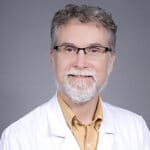The UofL Physicians – ALS Clinic is part of a network of just 50 ALS Association Recognized Treatment Clinics across the country. The ALS Association selects, recognizes and supports distinguished institutions through its Certified Center Program and has determined we are one of the best in the field when it comes to knowledge, skill and experience with amyotrophic lateral sclerosis (ALS), also known as Lou Gehrig’s disease.
As a recognized treatment clinic, we meet a national standard of quality and have a cohesive relationship with The ALS Association to fulfill its mission of helping people living with ALS and their families and to leave no stone unturned in the search for a cure. We provide highly personalized, evidence-based care in a supportive and family-oriented atmosphere.
With an on-site multi-disciplinary team of dedicated professionals and the latest in neurological diagnostics and imaging, we have the expertise to provide the best care possible in a compassionate, caring environment. The goal of this clinic is to provide optimal patient care and support while increasing the quality of life.
Clinic days are currently held twice per month, with a typical appointment lasting around three hours. This allows patients to see each member of the ALS team in one day. We strive for a smooth, comprehensive visit for each of our patients.
Research is the key to fighting ALS. To come up with treatments, the underlying cause must be understood. With this goal in mind, we launched an ALS research program in 2014 to give patients more hope through clinical trials that might make a difference and to help determine how the disease starts and why it progresses. For more information about our program, email fightALS@louisville.edu.
The ALS Association is the nation’s only nonprofit voluntary health organization dedicated solely to the fight against ALS. For more on The ALS Association, visit http://webky.alsa.org.
Diseases and conditions
Amyotrophic lateral sclerosis (ALS), also known as Lou Gehrig’s disease, affects as many as 30,000 Americans at any given time. It is a terminal, neurodegenerative disease that affects nerve cells in the spinal cord and brain, affecting the function of nerves and muscles. Motor neurons reach from the brain to the spinal cord, and from the spinal cord to the muscles throughout the body. The progressive degeneration of the motor neurons eventually leads to their death, and when they die, the ability of the brain to initiate and control muscle movement is lost.
ALS most commonly strikes people between the ages of 40 and 70. The life expectancy is approximately two to five years from diagnosis. The cause of ALS is unknown, and there is currently no cure.
ALS does not affect sight or hearing.
The disease was first discovered in 1869 by French neurologist Jean-Martin Charcot, but it wasn’t until 1939 that Lou Gehrig, the beloved baseball Hall of Famer who died from the condition at age 37, brought national and international attention to the disease.
While ALS has cut short the lives of several notable people, at no point in history has it received the level of attention by the public that it has in 2014 thanks to the “ice bucket challenge” that swept the nation.
For more about ALS, please visit The ALS Association’s website at als.org.
Signs and symptoms
An initial symptom of ALS might be a weakness in a limb that develops over the course of weeks or months. Later, this weakness may develop in another limb. Slurred speech or difficulty swallowing may also be initial symptoms. As ALS progresses, more symptoms often occur.
Other symptoms may be:
- Muscle twitching and cramping, especially in the hands and feet
- Loss of motor strength of arms and legs
- Impairment in the use of arms and legs
- Tripping and falling
- Dropping things
- Uncontrollable laughing or crying (pseudobulbar affects)
- Slurred or thick speech and difficulty in projecting the voice
Patients may also experience difficulty breathing and swallowing.
Treatments and services
We offer a comprehensive evaluation and treatment plan to maximize function and quality of life. We evaluate the patient’s neurological function and determine a care plan and medication needs.
Our multidisciplinary team includes a:
- Neurologist, to develop a treatment plan and monitor the condition as it progresses
- Nurse clinician, to assist in the assessment of the patient’s ever-changing needs
- Respiratory therapist, to help evaluate the respiratory status and provide techniques to improve respiratory function
- Physical therapist, to provide exercise programs to assist in maintaining muscle strength, and assistive technology to help the patient be as independent as possible as the disease progresses
- Occupational therapist, to help the patient with activities of daily living to help maintain independence
- Speech therapist, to evaluate speech and swallowing and educate the patient on safe techniques
- Social worker, to assist with the social and insurance needs of the patient and family
- Assistive technology consultants, to assess the need for assistive devices, such as powered mobility, telephone and computer access devices and augmentative communication
- Registered dietician, to help determine nutritional needs and recommendations to improve caloric intake
- ALS Association patient care coordinator, to assist patients and families with community resources and support groups
Psychological services are also available.
Some of the tests we offer are:
- Electrodiagnostic tests (such as electromyography and nerve conduction study): To evaluate and diagnose disorders of the muscles and motor neurons
- Laboratory tests
- Muscle and/or nerve biopsy: Removal of tissue or cells from the body for examination under a microscope
- Lumbar puncture: Used to measure pressure in the spinal canal and brain, and to determine if there is an infection or other issue.
- Magnetic resonance imaging (MRI): For detailed images of organs and structures within the body
- Genetic Testing
Treatment
There is no cure for ALS. Treatment is determined by the provider and patient and varies based on factors including age, overall health, medical history, the extent of the disease and expectations.
For most people with ALS, primary treatment focuses on the management of symptoms and may include physical, occupational, speech, respiratory, and nutritional therapies. Currently, there are two disease-modifying medications proven to help slow the progression of ALS. Other medications may help treat symptoms such as muscle cramping, drooling and pseudobulbar effects.
Managing the symptoms of ALS is a process that may be challenging. However, there are many community resources available for support and assistance.





